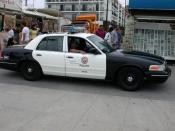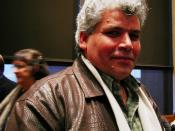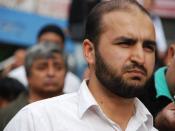Racial profiling, the police practice of stopping and searching of blacks because of their race, in the course of drug-interdiction efforts and combating crime, has become one of the most highly-charged racial issues in America. However, this issue that divides our nation along black and white lines, should not be an issue at all. Racial profiling is nothing more than a sensible police technique where police employ the laws of probability to make the best use of their scarce resources in attacking crime. The trafficking of drugs and weapons, and the effects these items have on the communities they end up in, has become a problem that plagues the nation as a whole. It is for this reason, and the loud cry of the citizens in these communities, that the federal government now funds a $37 billion "War on Drugs" that started during the Reagan presidency. While everyone agrees that drugs and weapons need to be cleaned off the streets of our country, most people seem to disagree that this should come as a result of police officers "playing the odds."
The deterrence of crime that racial profiling has created in recent years and the holes in the arguments against it substantiate this practice as both effective and necessary.
John Derbyshire wrote an article in National Review that stated "a policeman who concentrates a disproportionate amount of his limited time and resources on young black men is going to uncover far more crimes - and therefore be far more successful in his career - than one who biases his attention toward, say, middle-aged Asian women." It is this probability that the true form of racial profiling is based on. This is not to say that blind racism never occurs in law enforcement, because it does as in all things. However,



Racial profiling
I believe the term racial profiling is another 'race card' that some people like to hide behind. Legitimate profiling is a normal part of police work...if you are looking for terrorists you, target people who fit a certain description...or profile...Bin Laden is not going to turn up if we waste our time checking out clean shaven white guys with bald heads and pot bellies...
0 out of 0 people found this comment useful.